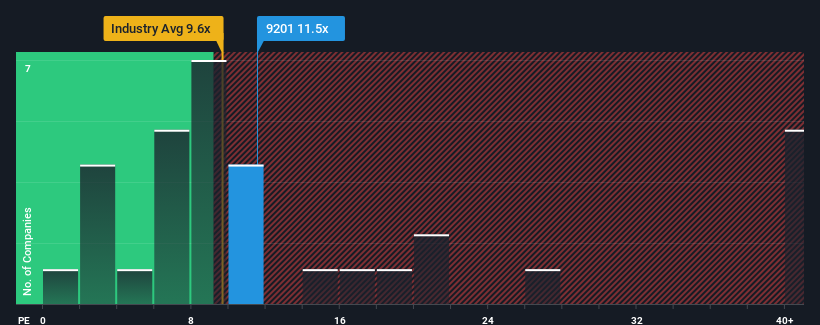Japan Airlines Co., Ltd. (TSE:9201) Might Not Be As Mispriced As It Looks

Japan Airlines Co., Ltd.'s (TSE:9201) price-to-earnings (or "P/E") ratio of 11.5x might make it look like a buy right now compared to the market in Japan, where around half of the companies have P/E ratios above 15x and even P/E's above 23x are quite common. However, the P/E might be low for a reason and it requires further investigation to determine if it's justified.
With earnings growth that's superior to most other companies of late, Japan Airlines has been doing relatively well. One possibility is that the P/E is low because investors think this strong earnings performance might be less impressive moving forward. If you like the company, you'd be hoping this isn't the case so that you could potentially pick up some stock while it's out of favour.
View our latest analysis for Japan Airlines

Does Growth Match The Low P/E?
In order to justify its P/E ratio, Japan Airlines would need to produce sluggish growth that's trailing the market.
Retrospectively, the last year delivered an exceptional 178% gain to the company's bottom line. Although, its longer-term performance hasn't been as strong with three-year EPS growth being relatively non-existent overall. So it appears to us that the company has had a mixed result in terms of growing earnings over that time.
Looking ahead now, EPS is anticipated to climb by 8.9% per annum during the coming three years according to the ten analysts following the company. Meanwhile, the rest of the market is forecast to expand by 9.6% per annum, which is not materially different.
In light of this, it's peculiar that Japan Airlines' P/E sits below the majority of other companies. It may be that most investors are not convinced the company can achieve future growth expectations.
The Bottom Line On Japan Airlines' P/E
Generally, our preference is to limit the use of the price-to-earnings ratio to establishing what the market thinks about the overall health of a company.
We've established that Japan Airlines currently trades on a lower than expected P/E since its forecast growth is in line with the wider market. There could be some unobserved threats to earnings preventing the P/E ratio from matching the outlook. At least the risk of a price drop looks to be subdued, but investors seem to think future earnings could see some volatility.
It's always necessary to consider the ever-present spectre of investment risk. We've identified 1 warning sign with Japan Airlines, and understanding should be part of your investment process.
Of course, you might also be able to find a better stock than Japan Airlines. So you may wish to see this free collection of other companies that have reasonable P/E ratios and have grown earnings strongly.
If you're looking to trade Japan Airlines, open an account with the lowest-cost platform trusted by professionals, Interactive Brokers.
With clients in over 200 countries and territories, and access to 160 markets, IBKR lets you trade stocks, options, futures, forex, bonds and funds from a single integrated account.
Enjoy no hidden fees, no account minimums, and FX conversion rates as low as 0.03%, far better than what most brokers offer.
Sponsored ContentNew: Manage All Your Stock Portfolios in One Place
We've created the ultimate portfolio companion for stock investors, and it's free.
• Connect an unlimited number of Portfolios and see your total in one currency
• Be alerted to new Warning Signs or Risks via email or mobile
• Track the Fair Value of your stocks
Have feedback on this article? Concerned about the content? Get in touch with us directly. Alternatively, email editorial-team (at) simplywallst.com.
This article by Simply Wall St is general in nature. We provide commentary based on historical data and analyst forecasts only using an unbiased methodology and our articles are not intended to be financial advice. It does not constitute a recommendation to buy or sell any stock, and does not take account of your objectives, or your financial situation. We aim to bring you long-term focused analysis driven by fundamental data. Note that our analysis may not factor in the latest price-sensitive company announcements or qualitative material. Simply Wall St has no position in any stocks mentioned.
Have feedback on this article? Concerned about the content? Get in touch with us directly. Alternatively, email editorial-team@simplywallst.com
About TSE:9201
Japan Airlines
Provides scheduled and non-scheduled air transport services in Japan, Asia, Oceania, North America, the Unietd Kingdom, and Europe.
Excellent balance sheet second-rate dividend payer.


